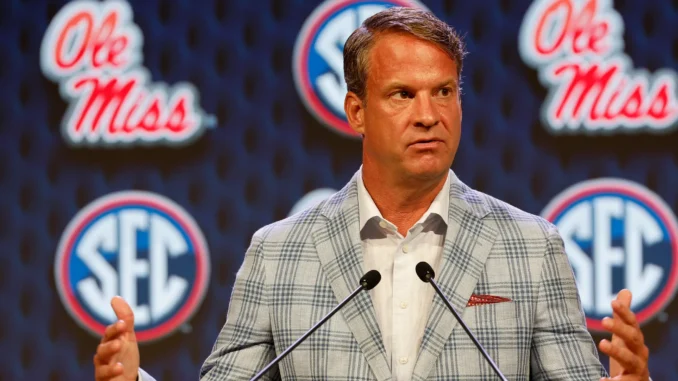
Ole Miss Rebels head coach Lane Kiffin has sparked a storm of controversy after announcing he will not be participating in the NCAA’s upcoming Pride Night, citing his desire to keep football separate from politics and social agendas. “On the field, it should be about football, not politics or agendas,” Kiffin stated firmly during a press briefing. His comments, made just days before the anticipated Pride-themed game celebrations, have already divided fans, commentators, and athletes across the country.
Kiffin’s decision marks the most high-profile public dissent against the NCAA’s recent efforts to celebrate inclusivity and LGBTQ+ representation within college sports. While some see his move as a courageous stand for traditional sportsmanship, others have condemned it as tone-deaf and exclusionary. The NCAA had rolled out Pride Night to promote diversity and send a message of support to LGBTQ+ athletes and fans, a gesture that has largely been applauded by progressive circles. Kiffin’s outright refusal to align himself with the initiative challenges the governing body’s increasingly visible social advocacy efforts.

Social media platforms lit up following Kiffin’s announcement, with hashtags like #BoycottPrideNight and #SupportLane trending alongside #FireKiffin and #FootballForAll. Supporters argue that Kiffin is exercising his right to focus solely on the sport and not allow external causes to overshadow team unity and performance. Critics, however, argue that his stance sends a harmful message to LGBTQ+ players and fans who look to football as a space of acceptance and belonging. Notably, several of Kiffin’s own players have yet to publicly comment, raising questions about internal locker-room dynamics.

The incident also reignites a broader cultural debate over the role of politics and social issues in sports. From kneeling during the national anthem to wearing pride-themed uniforms, athletes and coaches have increasingly found themselves at the crossroads of competition and activism. Kiffin’s boycott brings to the surface the unease many traditionalists feel about the evolution of sports into platforms for broader societal conversations. At the same time, it underscores the expectation that public figures must now navigate the intersection of personal belief and public responsibility.
As the NCAA prepares to proceed with Pride Night festivities, all eyes will be on Oxford to see how Kiffin’s decision affects his standing within college football and among his players. Whether his move will galvanize support or alienate his base remains to be seen. One thing is clear: in today’s game, the battles off the field are proving to be just as defining as the ones on it.
Leave a Reply